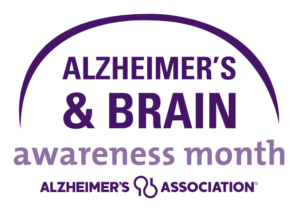Financial Planning When Someone Has Alzheimer’s Disease

In June each year, we work together with families, senior housing and healthcare professionals, elder law attorneys, and financial planners to raise awareness of Alzheimer’s Disease and how it impacts the finances of patients and their families. Over half of our clients are touched by Alzheimer’s, either personally or as family caregivers.
For families touched by Alzheimer’s, we start by creating an understanding of long-term care services that include both home- and community-based services, assisted living, memory care, and nursing homes. According to the 2022 Genworth Cost of Care Survey, these are the median costs for long-term care services. Note that costs vary according to where you live. For example, the costs in the DMV (Washington DC, Maryland, Virginia) are much higher than the national averages.
- Adult day services: $80 per day and $400 per week.
- Home care: A paid non-medical home health aide is $28 per hour and $1,113 per week (assuming 40 hours of care per week).
- Assisted living community: $4,635 per month or $55,620 per year.
- Nursing home (semi-private room): $268 per day or $97,747 per year.
- Nursing home (private room): $306 per day or $111,657 per year.
“Getting reliable home health care is not as available and affordable as it should be,” says Jennifer VanderVeen, president of the National Academy of Elder Law Attorneys.” And Jerry Love, a frequent lecturer on financing retirement and long-term care for the American Institute of Certified Public Accountants, says, “For the most part, the clients who have home care are private pay.” Many families cobble together a care budget from multiple sources, among them:
- Benefits (employee or retirement benefits or Veteran’s benefits)
- Personal Assets (such as savings, investments, rentals, and property)
- Borrowing (for example, by taking out a reverse mortgage or home equity loan)
- Government Funds (such as Medicare, Medicare Part D, Medigap, Medicaid, Supplemental Security Income (SSI), or Social Security Disability Insurance (SSDI) if you are younger than 65)
- Insurance (including annuities, long-term care insurance, and life insurance policies that can be used for qualified home-care expenses through cash value or an accelerated death benefit)
- Community Support Services (such as Meals on Wheels, respite care, transportation services, and more through the Community Resource Finder)
For families, the reality is that funding sources may not meet the needs of caring for someone with Alzheimer’s. “Nearly 11.2 million Americans serve as unpaid caregivers for people with Alzheimer’s disease or other forms of dementia, and 57% have been doing so for at least four years,” according to the Alzheimer’s Association’s 2021 statistical report. Family members and friends face the everyday stresses of caregiving, plus shouldering the costs of giving care to loved ones.
According to a 2021 AARP study, 75% of the family caregivers surveyed reported spending an average of $7,242 annually on out-of-pocket costs related to caregiving. “While financial challenges cross all segments of society, they hit hardest for Hispanic/Latino, African American, and younger caregivers — as well as those caring for loved ones with dementia,” says Nancy LeaMond, the Chief Advocacy and Engagement Officer for AARP.
“On average, individuals with Alzheimer’s live for four to eight years after their diagnosis, but some live as long as 20 years,” according to the Alzheimer’s Association. That can mean high healthcare and caregiving costs over the long term. Families will need to develop a strategy for how they might afford it.
It’s also essential for someone with mild cognitive impairment (MCI), signs of dementia, or Alzheimer’s Disease to be cautious. People with dementia should not be paying bills and managing money because they’re vulnerable to exploitation. They also need to give someone they trust access to financial information and the legal authority to make decisions when they become incapable of doing so themselves.
What are some early warning signs a financial advisor or family member may observe?
Talking about money needs to involve financial planners since they often have known clients for a long time and may observe cognitive changes. Michelle Rand, CEO of Cascade Investment Advisors, has seen these behaviors in clients who later developed Alzheimer’s or other forms of dementia:
- The client changes the topic in the middle of a meeting to something unrelated.
- The client exhibits an uncharacteristically quick temper.
- The client is late because she “took a wrong turn” one day, despite using the same place for every meeting.
- The client has intense worry over ordinary things even after reassurance.
- The client is uncertain about using a login to your website to access statements after previously being successful at the task.
- The client increasingly calls to ask the same questions repeatedly.
AARP recommends these four steps to focus on finances
- Start the discussion early. It’s often difficult to talk about money, but you need to get the lay of the land if you are the primary caregiver. Respectfully ask your loved one for access to bank accounts and health insurance policies to see how much is available to cover potential costs.
- Secure official permission to share information. Ask if your loved one is comfortable with doctors, hospitals, and insurance companies sharing information with you. If still capable of making this decision, the person can sign the papers or make the calls necessary to give you or another trusted party access. Don’t forget things like banks and utilities; you may become the bill payer.
- Address legal issues. If no durable power of attorney for health care and financial decisions has been designated, ask whether your loved one would like you or someone else the care recipient unequivocally trusts to take on that role. If your loved one doesn’t designate a power of attorney and later becomes incapable of choosing one, the courts will have to step in. Note that rules differ from one state to another.
- Stay alert to abuse. Note financial abnormalities, such as unpaid bills, unexplained bank withdrawals, or unusual visitors. Be especially cautious if your loved one mentions someone you’ve never met who’s been particularly “helpful.”
How can a financial planner help?
As clients live longer, financial advisors will be facing cognitive decline challenges more frequently. We found that it doesn’t pay to be tentative about the matter. Instead, our clients appreciated being prepared. Various resources are available, from AARP to the Alzheimer’s Association and Brain & Life to the National Institutes of Health (NIH), that have recommendations for financial planning for people with Alzheimer’s Disease. Here are the steps we recommend most frequently for our clients:
- The best advice is to act now, according to Brain & Life. Right after diagnosis or in the early stages of Alzheimer’s Disease (AD), a person may have no problems signing legal documents or handling finances. However, AD can progress quickly. A person with dementia might still be able to sign a will a year after diagnosis. But that person may not be able to sign other important planning documents, such as a revocable will. A person with dementia needs to put legal safeguards in place as soon as possible to minimize the likelihood of financial abuse in the future as their abilities decline. In addition to forgetting to pay bills, a person with dementia can be vulnerable to strangers or unscrupulous family members who may attempt to wrest control of property or withdraw money from bank accounts. One way to prevent financial oversights and abuse is to have a certified public accountant (CPA) or a trusted family member—but not the person named as the agent under power of attorney—receive duplicate copies of all monthly bank and brokerage statements. A CPA or trusted family member who reviews financial statements can catch problems and serve as an essential check and balance on the agent.
- Establish a financial power of attorney. It’s crucial that clients are clear about what powers the POA actually grants and which types of accounts it covers. According to Rethinking65, ideally, POA contact information should be shared with the financial advisor before cognitive decline begins, but then at first diagnosis of Alzheimer’s Disease. If the client doesn’t have a POA, they need to meet with a lawyer, and their financial advisors can usually recommend a few to the family. If the client wants to avoid the cost of a lawyer, most custodians offer a power of attorney form. However, most custodian forms can’t accommodate sophisticated provisions. For example, if you install a POA on a joint account as a custodian, and one of the account holders dies, the POA may need to be renewed for the remaining client.
- Rethinking65 advises clients to be prepared to use professional care, from daily money managers to care managers, and home care aides to handyman services. Caring.com also offers Find Memory Care Resources Near Me.
- According to Rethinking65, family members need to know other professionals like financial planners, accountants, lawyers, care managers, home care aides, doctors, and others to initiate contact, when necessary.
- Collect documents. Rethinking65 states, “identify passwords, accounts, and services that the client with Alzheimer’s Disease uses frequently. These could include banks, credit cards, brokerage accounts, social media, and even subscriptions. Maintain a list where it can be retrieved by family members, when necessary.” We also recommend making a folder for keeping two months’ worth of statements as they come in the mail or print electronic records.
- Consider senior living options when one partner has dementia, and the other doesn’t. Care at home may work for early and mid-stages of Alzheimer’s. But then, when it becomes unsafe, other options like live-in care or memory care in an assisted living community may be needed. Once healthcare needs are met, then financial planning needs to be included in the decision-making.
- Finally, there are additional considerations when managing someone else’s money. The Consumer Financial Protection Bureau offers a free 4-part guide:
Want to learn more about financial planning for Alzheimer’s Disease? Read our additional resources.
- The Alzheimer’s Association offers numerous articles about planning for Alzheimer’s and related dementias with topics such as planning for care costs, paying for care, insurance, Medicare, Medicare Part D benefits, Medicaid, Social Security disability, tax deductions and credits, planning ahead for legal matters, legal documents, healthcare reform, and healthcare appeals for people with dementia.
- Legal and Financial Planning for People with Dementia (NIH)
- Alzheimer’s Disease: Legal & Financial Planning (Bright Focus)
- Financial Planning for Alzheimer’s: Free & Paid Assistance Options (Paying for Senior Care)
- Financial Planning for Alzheimer’s & Dementia: Medicaid Planners, Attorneys & Other Options (Dementia Care Central)
- Financial Planning for Alzheimer’s (Kiplinger offers 24+ articles)
- Alzheimer’s Disease and Financial Planning (WebMD)
- When One Partner Needs to Move for Long-Term Care and the Other Doesn’t
- Recruiting Caregivers to Receive a Free Year of Bill Management Services Funded by a Grant from the National Institutes of Health (2022)
- Financial Planning in the Shadow of Dementia (MIT AgeLab, 2013)
- Financial Planning a Key but Neglected Part of Alzheimer’s Care (University of California, San Francisco, 2011)
- Financial Planning and Alzheimer’s/ Dementia (Jane Nowak, 2010)
- Bringing Health Care Issues into Financial Planning (Financial Planning Assoc., 2012)
